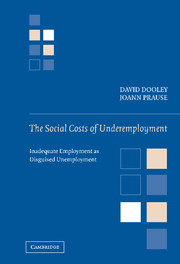Book contents
- Frontmatter
- Contents
- Preface
- 1 Disguised Unemployment and Changing Forms of Work
- 2 The Social Costs of Unemployment
- 3 Data Sources and Methods
- 4 Reverse Causation: Findings on the Selection Hypothesis
- 5 Leaving School: Self-esteem in an Unwelcoming Economy
- 6 Early Adulthood: Alcohol Misuse and Underemployment
- 7 Settling Down: Psychological Depression and Underemployment
- 8 Extending the Employment Continuum: Well-Being in Welfare Transitions
- 9 The Next Generation: Underemployment and Birthweight
- 10 Conclusions
- 11 New Directions
- Appendix A
- Appendix B
- References
- Name Index
- Subject Index
4 - Reverse Causation: Findings on the Selection Hypothesis
Published online by Cambridge University Press: 27 July 2009
- Frontmatter
- Contents
- Preface
- 1 Disguised Unemployment and Changing Forms of Work
- 2 The Social Costs of Unemployment
- 3 Data Sources and Methods
- 4 Reverse Causation: Findings on the Selection Hypothesis
- 5 Leaving School: Self-esteem in an Unwelcoming Economy
- 6 Early Adulthood: Alcohol Misuse and Underemployment
- 7 Settling Down: Psychological Depression and Underemployment
- 8 Extending the Employment Continuum: Well-Being in Welfare Transitions
- 9 The Next Generation: Underemployment and Birthweight
- 10 Conclusions
- 11 New Directions
- Appendix A
- Appendix B
- References
- Name Index
- Subject Index
Summary
… it is doubtful if many of them could or would work full time for long together if they had the opportunity. … there will be found many of them who from shiftlessness, helplessness, idleness, or drink, are inevitably poor.
Booth, 1892, pp. 42–43.INTRODUCTION
Background
A century of research has repeatedly found an association between adverse employment change – usually unemployment – and indicators of ill health, particularly behavioral and emotional disorders. However, the interpretation of this correlation has proved difficult. As noted in Chapter 2, at least three different mechanisms could account for it, each intuitively plausible: social causation, confounding, and selection.
Social causation views adverse employment change as the cause of ill health. The remaining chapters of this book will focus on this mechanism, with the others controlled. An ever-present rival explanation to both social causation and selection involves confounding by other variables. When the contributions of such confounding variables are removed, usually by statistical control, the initial association may weaken or disappear. Any prior variable that serves as a risk factor for both employment and health change could function as a confounder. For example, growing up in poverty may increase the risk of intermittent unemployment in adulthood because of educational inadequacies. In addition, it may increase the risk of ill health in adulthood as a result of inadequate health care in childhood or the acquisition of poor health habits.
Information
- Type
- Chapter
- Information
- The Social Costs of UnderemploymentInadequate Employment as Disguised Unemployment, pp. 65 - 87Publisher: Cambridge University PressPrint publication year: 2003
